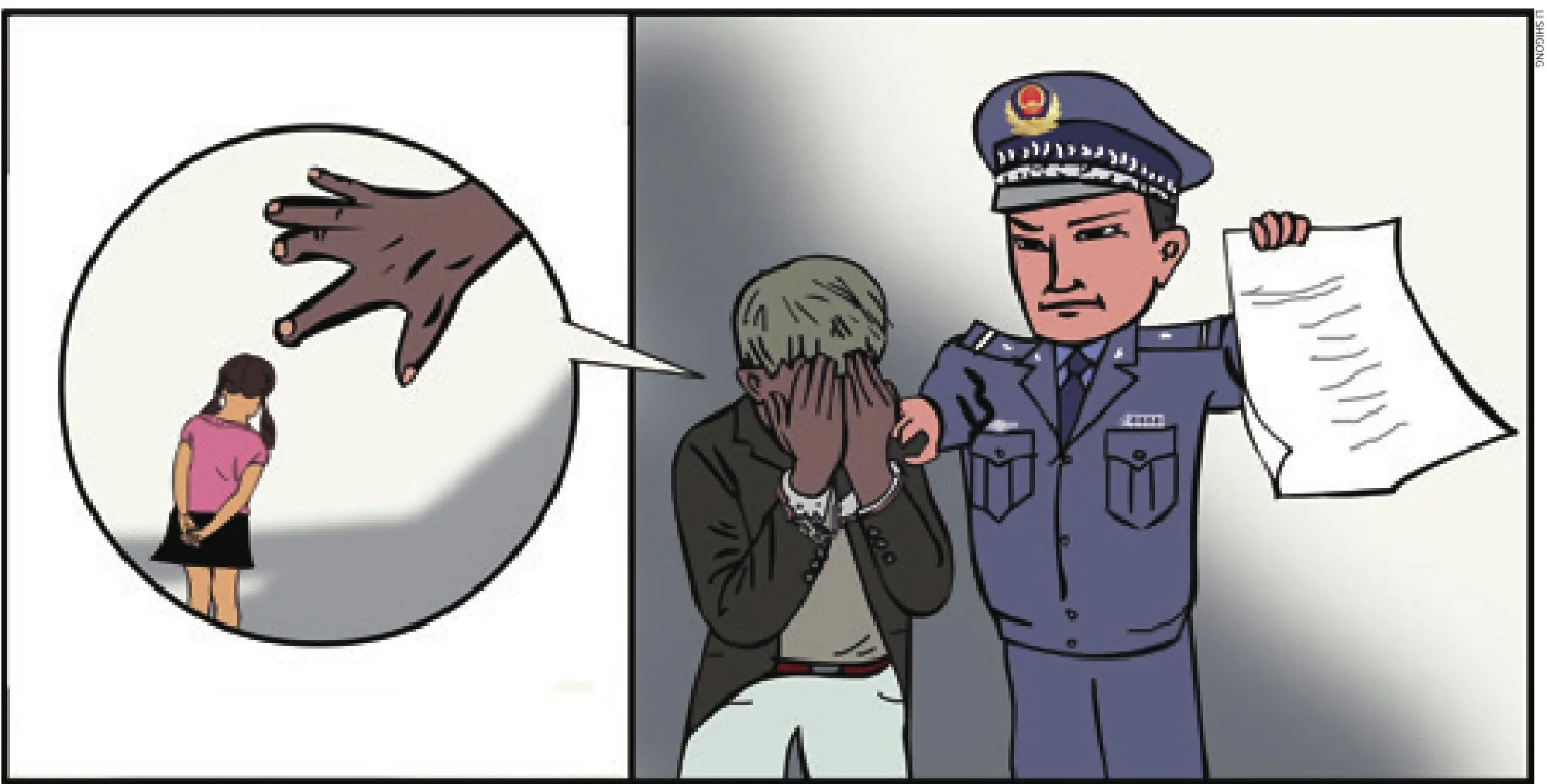Will the Chinese Version of Megan's Law Work?
2016-09-22
Will the Chinese Version of Megan's Law Work?
Dear Readers,Forum is a column that provides a space for varying perspectives on contemporary Chinese society. We invite you to submit personal viewpoints on past and current topics(in either English or Chinese).
yanwei@bjreview.com
Please provide your name and address along with your comments
In 1996, the U.S. Congress passed a law which requires all states to register sexual predators' personal information, including their residential address, and make it public after such criminals are released from prison. The federal law and subordinate state-level legislation, collectively referred to as Megan's Law, came about due to a tragedy involving a girl in New Jersey named Megan Kanka, who at the age of 7 was raped and killed by a neighbor in 1994. The neighbor had previously been sentenced twice for sexual assaults on children, but no one in the community knew about this. The girl's mother later said that if she had known,she would have taken preventive measures and the tragedy involving her daughter could have been avoided.
Recently, Cixi City of east China's Zhejiang Province enacted a Chinese version of Megan's Law which mandates public exposure of personal information of those who have committed sexual abuse of children after they have been released from prison. Personal details about each convicted offender will be posted on the websites of local police authorities and courts,including their identity photo, current address,workplace and criminal record. The purpose is to prevent the reoccurrence of similar tragedies by warning the public to avoid these people.
The increase in reported cases of sexual abuse of minors in China, even in kindergartens and primary schools, makes it urgent to produce effective measures to suppress such crimes. Rural children left behind by parents who have moved to cities for work are particularly vulnerable. Once victimized by sexual predators, children are likely to live in trauma for the rest of their lives, bearing serious psychological and physiological damage.
According to China's Criminal Law, those who sexually abuse children are subject to severe punishment.
When Cixi's local legislature passed the regulation to expose sexual offenders against children, people began to pin high expectations on it. Doubts about its effectiveness also exist,however, as it is a local regulation rather than a national law which does not apply to information held by police authorities in other parts of the country.
Child safety first
Yu Xiangling (Procuratorial Daily): Recent years have witnessed increasing cases of children being sexually assaulted, particularly among those who are left behind in rural areas by their migrant worker parents. The relatively high frequency of such cases has made them a non-negligible social issue. Although relevant laws and preventive mechanisms are developing, they are far from able to protect vulnerable children from sexual abuse.
We can learn from Megan's Law and, on the basis of ongoing efforts in protecting children from sexual assault, produce more effective laws, regulations and mechanisms in this respect.
E-files on sexual predators can be established and connected to a nationwide databank that can be queried by certain departments or individuals. But such inquiries must be conducted only by authorized personnel, so as to prevent the excessive openness of sexual predators' information.
There should be regular reporting of released sexual predators. The whereabouts of these people should be reported to local police authorities when they gain employment or move, etc. If no sexual assaults related to a specifc person are reported for a fxed period of time, they can be excluded from the reporting system, and their e-fles should be deleted from the nationwide databank, so that they won't live with the stigma for the rest of their life.
It's also important to impose certain restrictions on convicted sexual predators' choice of jobs. According to the seriousness of their crimes and their behavior in prison, released sexual offenders should be prevented from taking jobs that can frequently involve women and children, such as being a teacher or doctor.
Wu Xue'an (szjy.sznews.com): In reality,opening sexual predators' personal information is a controversial topic. On the one hand, sexual assault on minors causes severe physiological and psychological damage to the victims and may cast a shadow over them for the rest of their lives. Due to the seriousness of the crime, Cixi's regulation explicitly targets sexual offenders against minors. On the other hand,the openness of convicted rapists' personal information may constitute infringement of their privacy.
Throughout the world, sexual crimes against children make society indignant and anxious, but whether to publish the convicts' personal information is a diffcult decision. The public hopes to know about such information so that they can take preventive action. Revealing such details,however, will make it hard for these peopleto mingle with society again.
Whether Cixi's regulation is practical and effective will be demonstrated by its role in building up special networks in communities focused on preventing child sexual abuse crimes.
From 2012 to 2014, complaints about sexual assaults on girls received by the All-China Women's Federation increased by 10 percent. Taking judicial measures to ensure the protection of minors against sexual abuse appears urgent. Despite differences in detail between the various versions of Megan's Law in different countries, they share one thing in common: to overthrow the traditional practice of protecting convicts' privacy and instead expose their personal information to communities and society at large. Those who have sexual abuse records will be strictly limited in terms of the areas where they can reside and act.
The Cixi version of Megan's Law intends to shelter minors from sexual abuse as effectively as possible. Currently, the regulation is only effective within a limited area, and if something wrong is found during practice, it can easily be corrected. Although there is still some dispute, this regulation can serve as an example for deterring sexual predators throughout the country. From a long-term perspective, if it proves successful in Cixi, the local regulation needs to be made a national one, based on further improvement, to make the exposure of sexual assaults on minors a routine mechanism under law or administrative regulations.
Guo Zhijun (www.chinacourt.org): Sexual crimes against children have been frequently revealed by the media in recent years. Due to various reasons, such cases tend to be covered more heavily than other crimes,and those exposed are believed to be just the tip of an iceberg. The fight against child sexual assault is an arduous one. Unveiling released sexual predators' personal information to the public will help parents and children enhance their defense against these people. Meanwhile, it acts as a deterrent to convicted criminals, thus helping to reduce the reoffending rate. Notably, Cixi's regulation does not intend to drive former sexual predators to desperation. It contains detailed specifcations on the duration, channels and procedures related to exposing their information. While trying to deter sexual abuse, the statute also provides considerate protection for people who have turned their lives around.

Real side effects
Xi Yinghong (view.news.qq.com): The purpose of formulating Megan's Law is to curb sexual assaults on minors, but no solid evidence or statistics exist to support this result. There is no direct connection between registration and exposure of convicted sexual predators and decreasing crime rates. To know who has a sexual abuse record will not necessarily appease the public's nerves.
Not only is ordinary people's safety at risk, but those convicted are also made“vulnerable people.” The exposure of their personal information will make them aberrations in others' eyes, and sometimes they'll be attacked.
Since 2000, attacks on released sexual predators whose information has been revealed have jumped in the United States. An ex-rapist from Wisconsin reportedly complained that since no one believed that he could change, why should he try to change himself? As a result, some former offenders have fnally given in to despair and committed suicide or have continued to commit crimes and pose a threat to society. These consequences go against the original intention behind the legislation. ■
Copyedited by Chris Surtees
